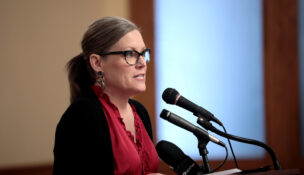Feds: Arizona child safety agency discriminates against parents, children with disabilities
Howard Fischer, Capitol Media Services//December 17, 2024//
Feds: Arizona child safety agency discriminates against parents, children with disabilities
Howard Fischer, Capitol Media Services//December 17, 2024//
The Arizona Department of Child Safety is violating federal law by discriminating against both parents and children with disabilities, according to the U.S. Department of Justice.
In findings released Monday, the federal agency said DCS does not communicate effectively with parents and children with hearing disabilities, including the failure to provide interpreters. The Justice Department also concluded the state has failed to reasonably accommodate the needs of parents with disabilities in several ways, including not providing information in a simplified form.
And the federal report also said DCS denies parents with disabilities an equal chance to participate in and benefit from DCS programs and services.
All that, the Justice Department concluded, violates the Americans with Disabilities Act.
“Under the ADA, parents and children with disabilities are entitled to fair and equal treatment by child welfare agencies, said Assistant Attorney General Kristen Clarke of the Justice Department’s Civil Rights Division in a prepared statement.
What makes all that important is that it is DCS that gets involved with families in cases of abuse and neglect. It is that agency that decides when to remove a child from a home, at least temporarily – if not forever – and what steps that parents need to take to be reunited with their children.
“The Civil Rights Division is committed to ensuring that unlawful discrimination does not interfere with a parent’s opportunity to stay with or be reunited with their child and that separations are not prolonged because a child welfare agency does not give parents the effective communication and reasonable accommodations that the ADA guarantees,” Clarke said.
So far, the federal government has not filed suit.
Instead, it sent a 13-page letter Monday to DCS Director David Lujan detailing in depth its findings and exactly why the Department of Justice believes the agency is violating the law.
More to the point, it contains a list of things that it says DCS must due, at a minimum, to come into compliance with federal law.
Most significantly, it requires the agency to develop and implement changes in policies and procedures to ensure not only that parents with disabilities have equal access to DCS programs, services and activities and that they do not lead to discrimination. That, according to the DOJ, must include changes in DCS assessments, case plans, psychological evaluations, service plans, visitation, and reunification programs and services.
The Department of Justice also wants both DCS workers and the private contractors with whom it works to undergo training and compliance with the Americans with Disabilities Act. That includes how to consistently document the disabilities of both parents and children and how to provide “appropriate modifications and effective communication” to both.
DCS also has been ordered to adopt and publish grievance procedures to resolve complaints against the agency for violating federal law as well as to pay unspecified compensatory damage to those who have complained for the injuries caused by the agency’s violations of the law.
The clock is running
In the letter to Lujan, Rebecca Bond, chief of the disability rights section of the Department of Justice, told him that he should contact her agency within two weeks “if Arizona is interested in working with the department to reach a solution.”
“We hope to collaborate with Arizona and agree on changes the state will make to remedy the violations,” she wrote. “We must inform you, however, that if Arizona will not negotiate or if our negotiations fail, the United States may take appropriate action – including initiating a lawsuit – to remedy Arizona’s ADA violations.”
In a prepared response, DCS said it is reviewing the findings of what it said was nearly five-year long investigation “and will work with the DOJ to remedy any alleged violations of law.”
The letter to Lujan details some specific examples of where the Department of Justice says the agency denies parents with disabilities an equal chance to show they can safely parent.
One case involves a father of two children who became involved with DCS when the children’s mother died shortly after giving birth to their younger child, who was born early.
According to DOJ, the state knew from the start the father, who lived independently, had a learning disability.
The agency removed the younger child amid concerns the father was not feeding the baby properly. While the agency did not identify safety concerns for the older child, it removed that child, too, based solely on the father’s disability and DCS speculation the father had “developmental delays.”
DCS subsequently returned the older child with no issues. But the Department of Justice said the removal was traumatic for both child and father because it happened shortly after the mother’s death.
The case of the younger child lasted several years, the DOJ said, with DCS focused on the father’s “cognitive limitations” and his “adaptability.”
“DCS employees made many decisions based on assumptions and stereotypes about the father’s disability,” the letter from Bond stated.
“They also did not consistently provide the father with the reasonable modifications he asked for or obviously needed, such as written summaries and oral explanations of the child’s medical appointments, or parenting classes or other services tailored for a parent with a learning disability,” Bond continued. “DCS gave the father no services to help him build skills to raise a child with medical needs.
After three years, Bond said, the father gave up his parental rights to his younger child.
The report cites other instances that include:
- DCS removing a newborn baby from a couple at the hospital based on generalized concerns that the mother’s autism and ADHD made her an unsafe parent, something DOJ said occurred based solely on her disability, with no actions or incidents the agency could identify as the basis for these concerns;
- Requiring a mother with traumatic brain injury to go for a neuropsychological evaluation based only on her history of TBI without identifying any specific concerns on how that was affecting her parenting, a move DoJ said likely prolonged her separation from her children;
- DCS refusal to provide even partially unsupervised visits to a couple, both with intellectual and developmental disabilities, even though they might be able to parent as a team with occasional help from their support system, and that DCS required multiple psychological evaluations “based on stereotypes and generalizations about parents with disabilities.”
And there was something else.
The report said some DCS employees used “derogatory and outdated terms” to refer to parents with disabilities.
“For example, DCS employees heard coworkers and supervisors call parents with mental health disabilities ‘crazy,’ ‘loony,’ or ‘psycho,” Bond wrote. “One DCS supervisor described a parent’s learning disability as “mental retardation” even though that term is outdated and an inaccurate description of a learning disability.














































